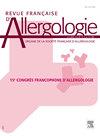Impact of atopic status, prior omalizumab use and baseline blood eosinophil count alone and in combination with total serum IgE on maintenance OCS reduction outcomes in patients with severe asthma treated with mepolizumab in the REALITI-A study
IF 0.3
4区 医学
引用次数: 0
Abstract
Prérequis/contexte
Maintenance OCS (mOCS) are commonly used for patients with severe asthma, despite well-recognized adverse event risk. Biologics have facilitated reduced mOCS reliance, e.g., the IL-5 inhibitor mepolizumab reduced mOCS dependence in patients with asthma in clinical trials and real-world studies.
Objectifs
This post hoc analysis of REALITI-A explored 2-year mOCS outcomes for patients receiving mOCS at baseline stratified by prior treatment with/eligibility for omalizumab, baseline blood eosinophil count (BEC) and serum total IgE and atopic status. Outcomes included 2-year change from baseline mOCS daily dose.
Méthodes
REALITI-A was a 2-year international, prospective, single-arm, real-world study enrolling patients with asthma newly prescribed mepolizumab (index date).
Résultats/discussions
Of 822 REALITI-A patients, 320 (38.9%) were receiving mOCS at baseline and 168 also had mOCS daily dose data after 2 years. Of patients who could be assessed for omalizumab eligibility (n = 114; 54 could not be assessed), 56% who were eligible at baseline had 100% reduction in mOCS daily dose after 2 years, versus 58% who were ineligible. Omalizumab use was associated with a numerical trend towards smaller proportion of patients with 100% mOCS daily dose reduction (48% with vs 59% without). More patients with BEC ≥300 cells/μL (67%) achieved 100% mOCS withdrawal than BEC <300 cells/μL (47%). For BEC/IgE, the proportion of patients with 100% reduction in mOCS use was highest for ≥300 cells/μL/≥81 KU/L (73 vs 55% for <300 cells/μL/ < 81 KU/L, 47% for <300 cells/μL/≥81 KU/L and 56% for ≥300 cells/μL/ < 0.81 KU/L). Among the patients with atopic status, 62% had 100% reduction in mOCS daily dose versus 67% without. Median mOCS dose reduction was ≥70% regardless of omalizumab use/eligibility, baseline BEC (/IgE), or atopic status.
Conclusion
These results reinforce mepolizumab effectiveness in severe asthma, demonstrating that real-world treatment is associated with mOCS independence regardless of prior biologic use and biomarkers.
REALITI-A研究中,特应性状态、既往使用奥玛珠单抗和基线血嗜酸性粒细胞计数单独及联合血清总IgE对使用美波珠单抗治疗的严重哮喘患者维持OCS降低结果的影响
尽管公认存在不良事件风险,但仍常用于重度哮喘患者。生物制剂有助于减少mOCS的依赖,例如,在临床试验和现实世界的研究中,IL-5抑制剂mepolizumab降低了哮喘患者对mOCS的依赖。目的:本realti - a的事后分析探讨了接受mOCS的患者的2年mOCS结果,这些患者在基线时按既往治疗/是否适合使用奥玛单抗、基线血嗜酸性粒细胞计数(BEC)、血清总IgE和特应性状态分层。结果包括基线mOCS日剂量的2年变化。m thodesrealti -a是一项为期2年的国际前瞻性单臂现实世界研究,纳入新开美polizumab的哮喘患者(指标日期)。在822例realti - a患者中,320例(38.9%)在基线时接受mOCS, 168例在2年后也有mOCS的日剂量数据。可评估omalizumab适格性的患者(n = 114;54例无法评估),56%基线时符合条件的患者2年后mOCS日剂量减少100%,而58%不符合条件的患者。使用Omalizumab与100% mOCS日剂量减少的患者比例较小的数字趋势相关(有48%对没有59%)。BEC≥300 cells/μL的患者(67%)比BEC≥300 cells/μL的患者(47%)达到100% mOCS戒断。对于BEC/IgE,≥300 cells/μL/≥81 KU/L时mOCS使用100%减少的患者比例最高(73% vs 55%;300 cells/μL/≥81 KU/L为47%,≥300 cells/μL/ <为56%;0.81骨/ L)。在有特应性状态的患者中,62%的患者mOCS日剂量减少了100%,而67%的患者没有。无论奥玛珠单抗的使用/资格、基线BEC (/IgE)或特应性状态如何,mOCS的中位剂量减量均≥70%。这些结果加强了mepolizumab在严重哮喘中的有效性,表明现实世界的治疗与mOCS独立性相关,无论先前的生物使用和生物标志物如何。
本文章由计算机程序翻译,如有差异,请以英文原文为准。
求助全文
约1分钟内获得全文
求助全文
来源期刊

Revue Francaise d Allergologie
Medicine-Immunology and Allergy
自引率
33.30%
发文量
349
期刊介绍:
La Revue Française d''Allergologie : un véritable forum pour faire connaître des travaux originaux et permettre la diffusion de l''information auprès de toutes les spécialités concernées par les pathologies allergiques. La Revue Française d''Allergologie (8 numéros par an) est au carrefour de nombreuses spécialités - dermatologie, pédiatrie, ORL, pneumologie, ophtalmologie, médecine interne - qui, toutes, ont à traiter des maladies allergiques. Les symptômes des allergies fondés sur des mécanismes communs sont le plus souvent associés et se succèdent chez un même patient. En forte progression depuis 20 ans, les maladies allergiques sont dans l''attente de perfectionnements et d''avancées thérapeutiques qui permettront aux nombreux patients qui en sont atteints de mieux vivre avec leurs allergies. La Revue Française d''Allergologie se veut donc un véritable forum de discussions et d''échanges entre tous les spécialistes confrontés aux pathologies
 求助内容:
求助内容: 应助结果提醒方式:
应助结果提醒方式:


